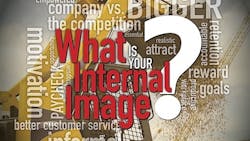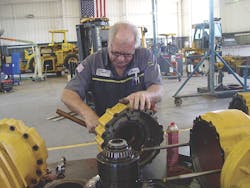About 10 years ago, I wrote an article entitled Mirror, Mirror, On The Wall, appearing in the February 2006 edition of RER Magazine. The article addressed the image your company portrays (consciously or unconsciously) to your customers and the outside world. Though that theory remains pertinent today, a decade of change has proved the Mirror, Mirror concept has imminently deeper roots: the image your company portrays internally, to your employees. In my 2006 article, I state, “Image is the sum of a number of small factors that add up to create a perception — a perception that operates on an emotional level, far from the tangible......”
Let’s think about that statement as it applies to your employees. When I graduated from college in the 1980s, the conventional wisdom was the employer was the “boss” and employees should be happy they have a job and a paycheck. Today, many of the rental store owners I work with are in their 50s and 60s, and came into the workforce when the “boss” mentality was prevailing.
A question I often ask managers and owners is, “Why do your customers deal with your company vs. the competition?” The answer is routinely something to the effect of: “We provide better customer service” or, “It’s my people.” Customer service is a direct result of responses from your employees to your customers. However, the major issue at question still prevails: What are you really doing to motivate, train and retain “your people.”
Somewhere along the line, especially as younger employees become a larger part of the workforce, the paradigm has shifted from the “boss” mentality. Millennials (roughly those currently in their late teens to early 30’s), will comprise 40 to 50 percent of the workforce by the year 2020. Considering those employees were not even born when I graduated college, it’s not surprising they have different expectations of what their relationship with an employer should look like.
First and foremost, employers should embrace the capabilities and perspective of younger workers. Keep in mind, just as many of your employees come from a different generation, so do your customers; not only have employee expectations of a business changed but, so have the expectations of your customers and therefore, your younger employees are likely your best bet to help you connect with a younger customer base.
Leading the paradigm shift of employee/employer relations have been high tech companies such as Google. A Google spokesman stated their goal was, “to create the happiest, most productive workplace in the world,” offering employee perks such as massages, free snacks and child care. Now, I can see the eyes of most rental store owners rolling and I’m not advocating such costly and high level perks; however, I am advocating keeping aware of and improving your image with your employees. Remember, a number of small factors add up to create a perception. Just like Google, your goal is to attract, motivate and retain the best managers, counter people, sales people, mechanics, drivers and administrative personnel: the very people that create the image of your company with your customer base.
Interestingly enough, more companies are finding exotic or unusual perks such as massages at work are not really all that important to employees. What’s really important are things that, ironically, are no-cost intangibles and really only require an open mind and open communication. The “my way or the highway” mentality is no longer effective with your workforce. Employees want to feel that business and policy decisions are made together, in conjunction with management, and including their input. Such decision making helps them feel a part of your company’s success and vision and that you care about them as a person. It can also give your business a family feel and give them a sense of importance. Let’s explore a few of these points in more detail as it relates to a rental business:
Being a part of something BIGGER
Employees need to be vested in your business: honest, open communication between ownership, management and employees is integral in this process. Do you solicit input and suggestions from your employees? Do you know your employees; not just their name but what motivates them, their family situation, their hobbies? Too often, busy owners or managers just breeze by their employees on the way in or out of the office, without even acknowledging the driver, mechanic or counter person. Build rapport with your employees, have conversations, seek input and suggestions.
Take the idea of being part of something bigger a step further: I’ve always advocated that rental stores become part of their community; this is especially true for independent, local companies. Winston Churchill once said, “We make a living by what we get, but we make a life by what we give.” Get involved in local civic organizations. Get your business involved; not just your money or contributions, but invest your time. We have a client that asks its employees for volunteers one afternoon a week to work in a local food bank. The program is strictly voluntary and, on any given week, anywhere from a handful to a dozen employees, spouses, family and children associated with the business give several hours of their time. Participants include ownership, the company’s accounting staff, mechanics, drivers, all levels of employees. At the food bank, everyone is equal, different non-work related skills are discovered and bonds far beyond those that can be forged in a workplace are formed. The company has been recognized for this service and, the owner’s wife was recently recognized as “Citizen of the Year” by the local chamber of commerce. Any community involvement needs to be sincere and meaningful and not just for “PR” purposes.
Reward hard work
Employees need to be empowered but they must also be accountable. Clear goals and objectives should be set for each employee, department, location and for the company as a whole. These goals should be developed jointly; the employee should have a full understanding of what your company is trying to accomplish and how the employee can influence the achievement of that goal. The goals could be anything from achieving a certain percentage of on-time deliveries, to response time on service calls or controlling overtime.
If there is shared success, there should be a shared reward. Every company should have an employee bonus/incentive system that lets the employees participate in your company’s successes. These plans should be based on realistic and achievable goals upon which employees can actually have a positive influence and impact.
Monetary consideration is not everything; the opportunity for advancement is also an important motivator for today’s workforce. I spoke with the human resources director for a large organization with a number of younger staff members, who indicated many younger employees switch jobs in the one- to three-year time frame if they feel they are not advancing. In order to combat employees’ frustration of feeling stuck, the company created a number of new intermediate-type positions such as assistant shift leader, crew leader, and assistant general manager so younger employees feel they are advancing within the organization. Such practice goes against the previous generation’s mentality of waiting three to five years (or more) for the next big promotion. In the rental business, these roles may translate to positions such as assistant lead mechanic, lead mechanic, shop supervisor or even category type roles such as lead mechanic-heavy equipment or lead mechanic-small tools, etc; and, are principles which can be applied to any of your departments: service, sales, counter, delivery or administrative.
Encourage through guidance and lead by example
Feedback and dialogue via regular review process is essential; an annual review may no longer be enough. The feedback process should be ongoing; younger workers often require more positive feedback in short bursts, which may even be something as simple as recognizing a job well done on handling the last customer interaction. The goal of your communications is establishing clear expectations of the employees, reinforcing good performance, improving unsatisfactory performance, and fostering a spirit of cooperation and teamwork.
Regardless of the age of the employee, you as an owner or manager need to set a good example. A common theme of my articles over the years has been: “your people will do what you do.” If you work sporadically, are unfriendly, uncaring and don’t keep your truck and office clean, then don’t be surprised if your attitude is directly mirrored in your business. Likewise, if you are the first to arrive in the morning, the last to leave, pick up trash when you walk the yard and are friendly and engaging to employees and customers, your positive influence will also be positively reflected in your business.
We recently worked with a large rental company in the northern United States whose mechanics and drivers are all unionized. I had been in other shops in the area that got the job done, but you could sense the tension between the union employees and management. Store owners complained about the cost of doing business and the union only drove those costs higher.
However, our client had a completely different attitude that resulted in a positive feel in his operation. He embraced the union and, there was a warm sense of community between him and all employees. The shop area was immaculate, the service trucks and delivery vehicles were immaculate. The owner has spent significant dollars on facilities including state-of-the-art hose reels and air delivery systems to make the mechanics’ job easier. The shop was well lit, well heated, well ventilated and had a comfortable break area including locker facilities. The owner made it clear to all employees he had high standards; those standards were understood and respected by the employees and in return, he provided a good wage and excellent working conditions. Furthermore, the owner was also one of the hardest working employees in the business.
A word of caution to rental store owners regarding your perception among your employees: Many owners have done well over the years; you’ve taken risks, you’ve worked hard, the last few years have been good and you’ve been rewarded for your efforts. Many of you have rewarded yourself with “toys:” classic or exotic cars, boats, motor homes, etc. Often, owners think their rental yard has some extra space and that’s a good place to keep them; some owners even think it’s not a bad thing to show their employees the rewards of hard work.
However, that is just another paradigm that has shifted, just as many I have discussed in this article. Some of the bond, the teamwork carefully put together and created through other factors in your business practices, can be lost through such shows of perceived ego. If you can afford the fast boat or car, you can afford to store it off site where it’s not top of mind with your employee each day, reminding everyone of what all you have, yet, what little they have.
Remember, you as the owner or manager set the tone for the business, the tone for your employees. Setting high standards for yourself will translate into your employees having high standards for themselves. My father once told me, “The problem with setting the target low is that you just might hit it.”
Final food for thought
Since we are talking about image, I would urge you to go back and review the image article from 10 years ago. The basic principles are still the same. I also cannot over-emphasize the importance of keeping a clean and attractive workplace. Those of you who know me know one of my pet peeves is substandard housekeeping which results in dirty, cluttered work environments that negatively affect the image your business portrays to both employees and customers.
We are in a political year in 2016 and politics give us some insight into what the broader public is thinking. Regardless of who your candidate is, business owners should note people are fed-up with the “establishment” setting rules with no input from the people. It’s clear people want a “voice,” be it with their employer or, with their politics. Counter to what many feel, I believe the bulk of the public -- your employees -- are willing to work for their paycheck, their rewards; they would just like some input and to be heard by their leader, that is, their employer. Change your workplace from an “us/them” mentality to a “WE” mentality and all will benefit.
Gary Stansberry is the President of The Stansberry Firm, LLC and specializes in business sales, fair market business valuations and operational consulting, including positioning businesses to increase their value. More information on the company can be found at www.thestansberryfirm.com. Gary can be reached at (210) 797-7368 or by email at [email protected].
About the Author
Gary Stansberry
Founder and president
Gary Stansberry is president of The Stansberry Firm LLC and specializes in business sales, fair market business valuations, operational consulting and positioning businesses to increase their value.


